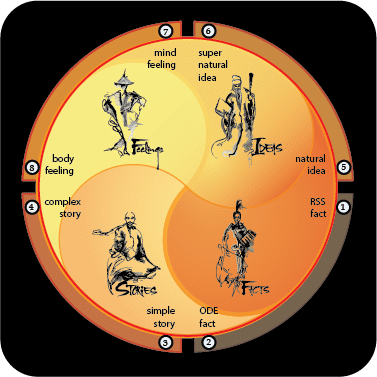What is an Analogy, and Why the Need for a Hypothesis?
Alex, whether you realize it or not (and at the risk of inciting any currently attending science-police), this question is at the heart of what’s wrong with the current scientific method. And despite this method having done much good, in truth, it fails to make discoveries close to one hundred percent of the time. Imagine. Ironically, these failures happen not because scientists do not try hard enough. Most scientists try really hard. The failures happen mainly because the current method requires them to begin with a hypothesis. And the see why doing this is a problem, consider this story.
A drunk lost his keys, and his friend came upon him looking for them under a street light. The friend asked the drunk what he was doing. The drunk said, “I’m looking for my keys.” The friend then asked, “Where did you last see them?” The drunk answered, “Over there, across the street, by my car.” The friend then asked, “Then why are you looking over here, under the street light?” The drunk answered, “Because this is where the light is.”
A hypothesis is “where the light is.”
In effect, a hypothesis is a guessed answer constructed from what you can see. Unfortunately, it turns out this closes minds. Why? Because starting with an answer severely limits the field within which scientists search. Not realizing this, the current method then continues this focus and does experiments to test this guessed answer. At which point, the outcomes are seen as either proof for or against the guessed answer.
The alternative is to do what babies do. Stick with questions. Babies learn faster and more than adults, because their questions keep their minds open. Imagine how much more scientists could discover if they had a method which guaranteed discoveries. Working with open minds rather than with closed minds would be a big step towards this.
Someone then Asked: Isn’t this the hypothesis in your analogy, “Over there, across the street, by my car.”?
My Response: Another interesting question, Nathan. I like your curious mind. The short answer is, an analogy isn’t an answer. It’s a pattern-seeking tool. Analogies, by their very nature, provoke questions and open minds. Whereas a hypothesis is a guessed answer, and the focus is on proving or disproving this answer. This biases and limits the conditions under which you make your search.
The longer answer is that an analogy is a condition, story, or set of traits which parallels an otherwise unrelated condition, story, or set of conditions. Here, contrasting and comparing these two sets can lead to an almost unlimited number of questions. The hope is that exploring these lines of questioning will reveal the patterns of connections underlying both sets. And if this is done well enough, then new lines of questioning, along with new connections, will keep emerging.
A hypothesis, on the other hand, is a possible “line of answers.” And by nature, answers are endings, not beginnings. As such they include no inherent parallels or connections but rather a true or false outcome. And to see why this difference matters, consider the following thought experiment.
Imagine you are expert in the local star constellations. Now imagine I ask you to get a 3 foot by 3 foot piece of cardboard and to cut a quarter-sized hole in the center of this cardboard.
Now imagine I ask you to take this cardboard out into your backyard and hold it up to the night sky. Moreover, as you do, I ask you to center this hole on a star. Any star.
Question one is, could you tell me which constellation this star belongs to?
Now imagine I ask you to put the cardboard down, and to look at the same star.
Question two is, would you be able to tell me which constellation this star belongs to now?
The point of this thought experiment is simple. Science is an attempt to understand the nature of our world. Moreover, scientific things, and all things really, get their meanings from only one place. They get their meanings from the connections they make to other things. No connections. No meanings., scientific or otherwise.
